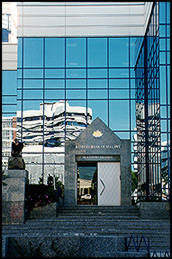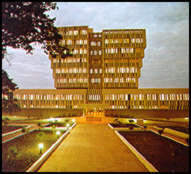
Could you provide us with an overview of the Reserve Bank structure?
The Reserve Bank of Malawi was created in 1965 under an act of Parliament essentially to manage the local currency, the monetary program, as well as to be the management authority for the country. The Deputy Governor and myself are appointed by the President, and the others are appointed by myself with Board approval. The Board is in charge of the daily management and I am responsible for the day-to-day running of the Institution. We work very closely with the 7 people who are constituting the Board.
The Reserve Bank of Malawi is a supervisory authority, which means that we have a department which oversees all activities of the financial sector. We help banks which intend to implement themselves here. There are only 4 top positions: the Governor, the Deputy Governor and two General Managers. Then there are eleven Heads of Departments for each departments within the Bank, of which 6 are attached to economic services and the remainder deal with support services.
What have been the most recent developments in the Financial sector within the past two years?
One of the most important economic activities has been the depreciation of the Kwacha in August 1998, which depreciated by about 48%. It was actually a major but not the largest devaluation that the Malawi Kwatcha ever faced; the worse one was in 1994. Yet this latest devaluation has shifted financial investments from a long term to a short term focus. As a result of the devualation, we have been facing a very high inflation which reached 56% in the middle of 1999. Interest rates went up to the lower 50 percentile. So the Governement was one of the major tools which people have been investing in. This has been a major driving force in the activity of the financial sector.
Over the same period, we had two other major changes. For the first time, we had the influence of a Merchant Bank which started last year. Before, we only had retail banks, and Loita Investment Bank came in last year and added a certain of flavour because of the specialized services which they have brought into the market. We are seeing Loita as an opportunity for the country’s financial sector to expand regionally, which has been a major challenge for Malawi. We also did the restructuring of the Finance Corporation, and its ownership was sold out to a South African Bank.
Now we have to reverse the influence of the previous governement that had driven out international banks that were here until 1970s. At this time, the Cabinet was very agressive in owning most of the corporations of the country. We now have to work our way back into the Global village. It is time for us to demonstrate the many opportunities which we can offer to the international business community.
Companies such as Loita Investment Bank are the stepping stones to attract investments. Do you have a strategy to attract foreign banks into Malawi? Which type of incentives are you using?
The Government is liberalizing the financial sector and the whole economy. Since 1994, it has aggressively tried to liberalize the financial sector. Some of the banks owned by the Governement are now being offered for sale to strategic partners. We want private investors to inject money into the banks in order to make the sector more competitive and therefore more effective. Whenever our local banks, external institutions, or banks we are dealing with give us advice, we are very forthcoming.
First and foremost, the central strategy is to be very welcoming. Secondly, we are privatizing banks that were owned by the Governement in order to create an open environment. And then, we are responding to the demand of the international banking community. We have been generating a dialogue with the banking sector here in order to make sure the environment is condusive for their financial activities.
It is very important that the environment look as transparent as possible to attract and promote foreign investments within Malawi. The climate should look more and more attractive before the end of the year. What kind of relationship do you have with the banking sector internationally and what communication tools do you use to show what Malawi has to offer?
Malawi is a member of a number of international banks. For instance, we are member of the Bank of International Settlements. We work very closely with the Bank of England. We network a lot with banks around the World and we deal very closely with the Central Reserve, particularly of New York. CitiBank is also very close to us – they are actually part of our fund managers. The relationships we try to develop with the major banks is to establish them as the custodians of our foreign reserves to manage on our behalf. That way, they get to know us and see the credibility we have. | Regionally, we also belong to the SADC. The Comity of SADC Central Bank Governors is a very influencial body that deliberates on issues such as harmonizing management policies and creating a favourable business climate. In essence, it should not matter whether our banks are in Malawi or anywhere else in the region. The business community should see that they can access the whole region from here, thereby building a common platform.
In this part of the world, we are lucky to be in proximity to South Africa which offers us a window to first world banking activities. By dealing with them, we are able to copy some of their processes and benefit from their knowledge.
As far as the banking system developping so quickly within the region, what has South Africa done to be so successful?
I think they have a more diversified economy and a very strong industrial base. It has helped them to attract investments. An investor will not come to Malawi purely for Malawi’s sake – this market is too small for most investors. They would come here if they knew that being in Malawi means integrating within a regional country. Whatever they are doing here, they will be looking at a much greater market potential. Investors must understand that Malawi is the heart of the region.
Previously, South Africa was mostly trading with Europe. In fact, current figures now indicate that South Africa is trading at a much higher level within the region, because all of us now look toward the South. Whenever we need anything, we know we can find it there. It is the same for expertise as well. Here, we have some South African background. Actually, most of the industrial products you will find in the region are manufactured and exported from South Afric

Infrastructure traditionally supports economic growth. What can you tell us about the infrastructure here?
Malawi offers a great potential for infrastructure growth. We are far behind, even in comparison with regional standards, and there is a need to modernize our telecommunication infrastructure. Back in the mid 80s we had one of the best telecommunications network in the region, but now we have been overtaken by the other countries. The problem is that we have come from a regulated environment where we have to liberalize and allow private operators to come in.
The potential here is tremendous. The President is now attending meetings in London and is negociating to have BBC broadcasting reach Malawi Radio so that everyone will have access to clear and precise inforamtion. Investors that are interested to get into media and telecommunication should look very carefully at Malawi as the field is clearly opens. We need to modernize it.
We are coming from a regime where we have always been told what to do, what to say. So most of the people are still septical about taking decisions and acting on their own behalf. Numerous Malawians have difficulties saying that the Government should not be that involved into the economy. Therefore, if we give the power to the people, they will do the right thing.
It is a public sector duty to provide a vision, but at the same time we should leave the leadership to the private sector. In the banking sector, there are still many public implications. Look at Commercial Bank and National Bank: government involvement is still too heavy in both these institutions.
How is the revenue of privatisations come through?
We have not reached all our expectations. If you try to sell a company that is not completely viable, you cannot expect to get the most of it. Despite that, the Governement raised 1 billion kwachas out of the privatisation program. Privatisation has not moved as quickly as we were expecting essentially because state-owned companies were not financially attractive.
What is the image of the Reserve bank of Malawi?
I think we have a very positive image. This institution has actually stayed away from any scandals.
What would be your final message to our Forbes Global readers?
We are hoping that investors will bring in capital to Malawi, establish themselves here and create employment. In the long run, it will benefit the country and private sector investors as well.
|

